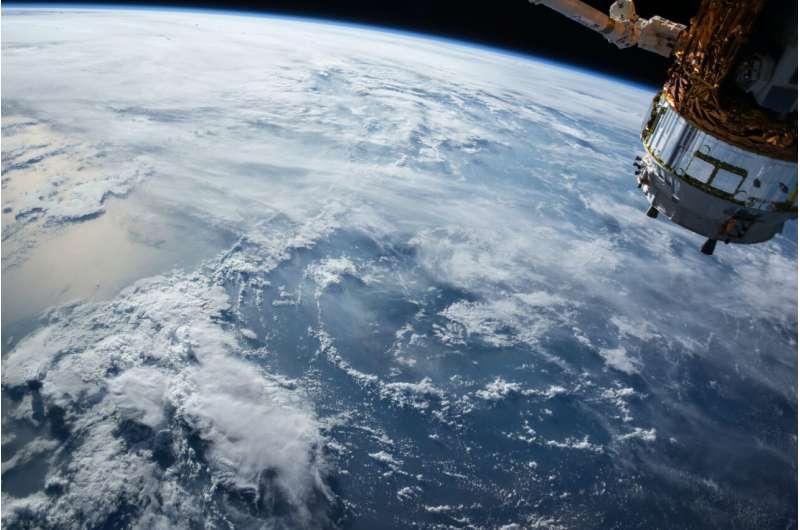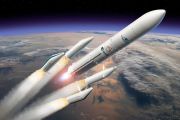
Copernical Team
Physicists confront the neutron lifetime puzzle
 To solve a long-standing puzzle about how long a neutron can "live" outside an atomic nucleus, physicists entertained a wild but testable theory positing the existence of a right-handed version of our left-handed universe. They designed a mind-bending experiment at the Department of Energy's Oak Ridge National Laboratory to try to detect a particle that has been speculated but not spotted. If fo
To solve a long-standing puzzle about how long a neutron can "live" outside an atomic nucleus, physicists entertained a wild but testable theory positing the existence of a right-handed version of our left-handed universe. They designed a mind-bending experiment at the Department of Energy's Oak Ridge National Laboratory to try to detect a particle that has been speculated but not spotted. If fo Floating in space might be fun, but TBone study shows it's hard on earthly bodies
 Ever wondered if you have anything in common with an astronaut? Turns out there are 206 things - your bones. It's these parts of our body that are the focus of a research study on bone loss in astronauts, and the important question of whether bone can be re-gained after returning to Earth.
The TBone study was started in 2015 by Dr. Steven Boyd, PhD, director of the McCaig Institute for Bon
Ever wondered if you have anything in common with an astronaut? Turns out there are 206 things - your bones. It's these parts of our body that are the focus of a research study on bone loss in astronauts, and the important question of whether bone can be re-gained after returning to Earth.
The TBone study was started in 2015 by Dr. Steven Boyd, PhD, director of the McCaig Institute for Bon Virgin Orbit rocket launches 7 US defense satellites

A Virgin Orbit rocket carrying seven U.S. Defense Department satellites was launched from a special Boeing 747 flying off the Southern California coast and streaked toward space Friday night.
The modified jumbo jet took off from Mojave Air and Space Port in the Mojave Desert and released the rocket over the Pacific Ocean, northwest of Los Angeles.
The launch was procured by the U.S. Space Force for a Defense Department test program. The seven payloads will conduct various experiments.
"And there we have it, folks!" the company tweeted shortly before 1 a.m. local time, about an hour after the rocket separated from the 747. "NewtonFour successfully reignited and deployed all customer spacecraft into their target orbit."
It was Virgin Orbit's fourth commercial launch and first night launch. The launch was originally scheduled for Wednesday night, but that attempt was scrubbed due to a propellant temperature issue.
Virgin Orbit named the mission "Straight Up" after the hit on Paula Abdul's debut studio album "Forever Your Girl," which was released through Virgin Records in 1988.
Virgin Orbit was founded in 2017 by British billionaire Richard Branson.
Novel NASA instrument sets sights on Earth-bound solar radiation
 A very small instrument has a big job ahead of it: measuring all Earth-directed energy coming from the Sun and helping scientists understand how that energy influences our planet's severe weather, climate change and other global forces.
About the size of a shoebox or gaming console, the Compact Total Irradiance Monitor (CTIM) is the smallest satellite ever dispatched to observe the sum of
A very small instrument has a big job ahead of it: measuring all Earth-directed energy coming from the Sun and helping scientists understand how that energy influences our planet's severe weather, climate change and other global forces.
About the size of a shoebox or gaming console, the Compact Total Irradiance Monitor (CTIM) is the smallest satellite ever dispatched to observe the sum of Hubble delves into cosmic treasure trove
 This image from the NASA/ESA Hubble Space Telescope captures the sparkling globular cluster NGC 6569 in the constellation Sagittarius. Hubble explored the heart of this cluster with both its Wide Field Camera 3 and Advanced Camera for Surveys, revealing a glittering hoard of stars in this astronomical treasure trove.
Globular clusters are stable, tightly bound clusters containing tens of t
This image from the NASA/ESA Hubble Space Telescope captures the sparkling globular cluster NGC 6569 in the constellation Sagittarius. Hubble explored the heart of this cluster with both its Wide Field Camera 3 and Advanced Camera for Surveys, revealing a glittering hoard of stars in this astronomical treasure trove.
Globular clusters are stable, tightly bound clusters containing tens of t Gemini North spies ultra-faint fossil galaxy discovered on outskirts of Andromeda
 An unusual ultra-faint dwarf galaxy has been discovered on the outer fringes of the Andromeda Galaxy thanks to the sharp eyes of an amateur astronomer examining archival data processed by NSF's NOIRLab's Community Science and Data Center. Follow-up by professional astronomers using the International Gemini Observatory, a Program of NSF's NOIRLab, revealed that the dwarf galaxy - Pegasus V - cont
An unusual ultra-faint dwarf galaxy has been discovered on the outer fringes of the Andromeda Galaxy thanks to the sharp eyes of an amateur astronomer examining archival data processed by NSF's NOIRLab's Community Science and Data Center. Follow-up by professional astronomers using the International Gemini Observatory, a Program of NSF's NOIRLab, revealed that the dwarf galaxy - Pegasus V - cont Another Webb Telescope instrument gets the "go for science"
 The second of NASA's James Webb Space Telescope's four primary scientific instruments, known as the Mid-Infrared instrument (MIRI), has concluded its postlaunch preparations and is now ready for science.
The last MIRI mode to be checked off was its coronagraphic imaging capability, which uses two different styles of masks to intentionally block starlight from hitting its sensors when attem
The second of NASA's James Webb Space Telescope's four primary scientific instruments, known as the Mid-Infrared instrument (MIRI), has concluded its postlaunch preparations and is now ready for science.
The last MIRI mode to be checked off was its coronagraphic imaging capability, which uses two different styles of masks to intentionally block starlight from hitting its sensors when attem AI experts called on to join the hunt for exoplanets
 Artificial Intelligence (AI) experts have been challenged to help a new space mission to investigate Earth's place in the universe.
The Ariel Data Challenge 2022, which launches on 30 June, is inviting AI and machine learning experts from industry and academia to help astronomers understand planets outside our solar system, known as exoplanets.
Dr Ingo Waldmann, Associate Professor i
Artificial Intelligence (AI) experts have been challenged to help a new space mission to investigate Earth's place in the universe.
The Ariel Data Challenge 2022, which launches on 30 June, is inviting AI and machine learning experts from industry and academia to help astronomers understand planets outside our solar system, known as exoplanets.
Dr Ingo Waldmann, Associate Professor i Tonga volcano eruption trigged atmospheric gravity waves that reached the edge of space
 The eruption of the Hunga Tonga-Hunga Ha'apai submarine volcano in January 2022 was one of the most explosive volcanic events of the modern era, a new study has confirmed.
Led by researchers from the University of Bath and published in Nature, the study combines extensive satellite data with ground-level observations to show that the eruption was unique in observed science in both its magn
The eruption of the Hunga Tonga-Hunga Ha'apai submarine volcano in January 2022 was one of the most explosive volcanic events of the modern era, a new study has confirmed.
Led by researchers from the University of Bath and published in Nature, the study combines extensive satellite data with ground-level observations to show that the eruption was unique in observed science in both its magn Eyeing Kukenan - Sols 3519-3524
 Curiosity is continuing to proceed through our pre-planned checklist of activities that we've made for drill campaigns. The team is currently waiting for the downlink that contains data from CheMin's first analysis of the Avanavero drilled sample, and we will use these data to help us decide whether to analyze the sample with SAM as well. While we wait today, we planned a whopping six sols worth
Curiosity is continuing to proceed through our pre-planned checklist of activities that we've made for drill campaigns. The team is currently waiting for the downlink that contains data from CheMin's first analysis of the Avanavero drilled sample, and we will use these data to help us decide whether to analyze the sample with SAM as well. While we wait today, we planned a whopping six sols worth 






























